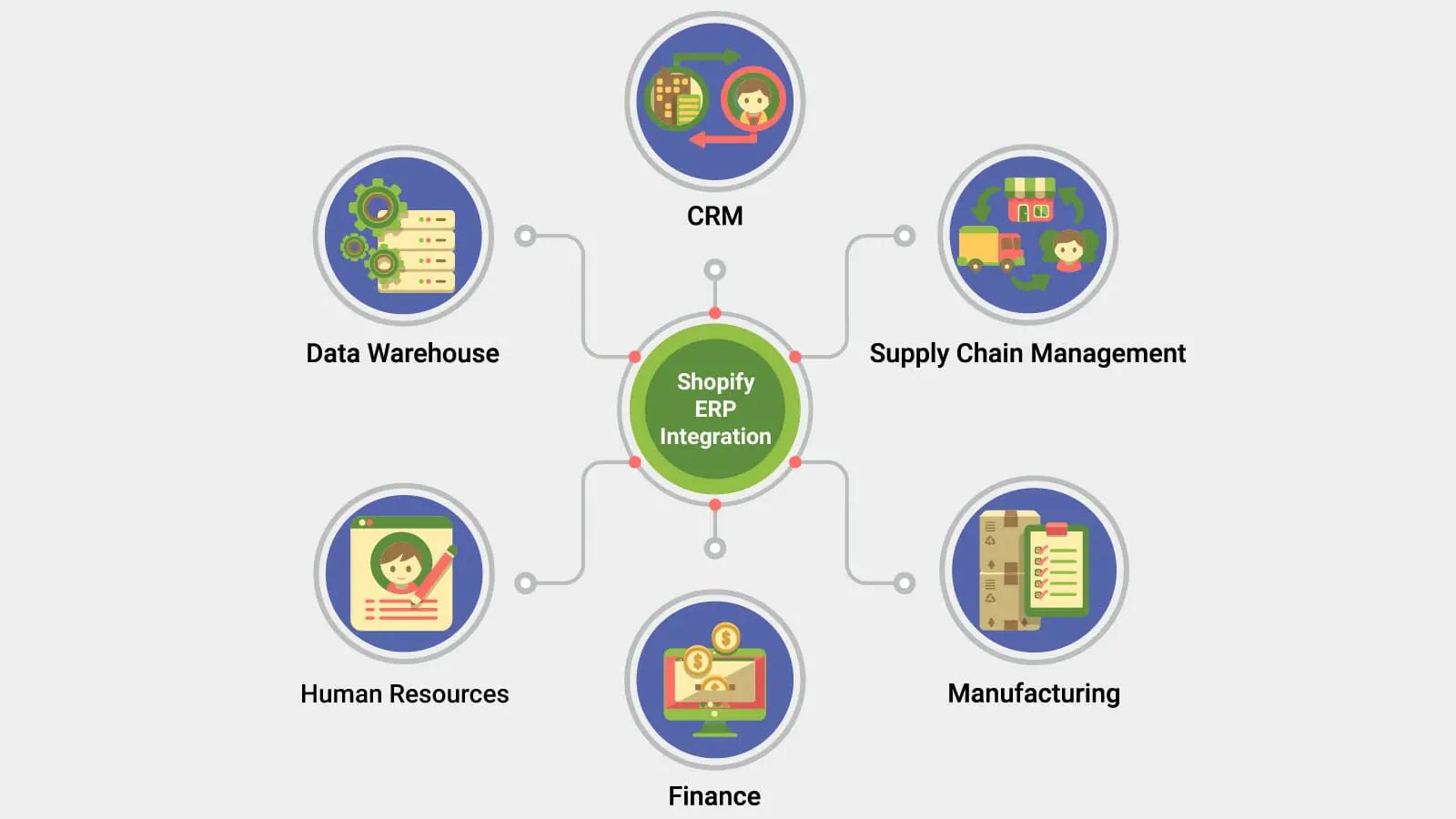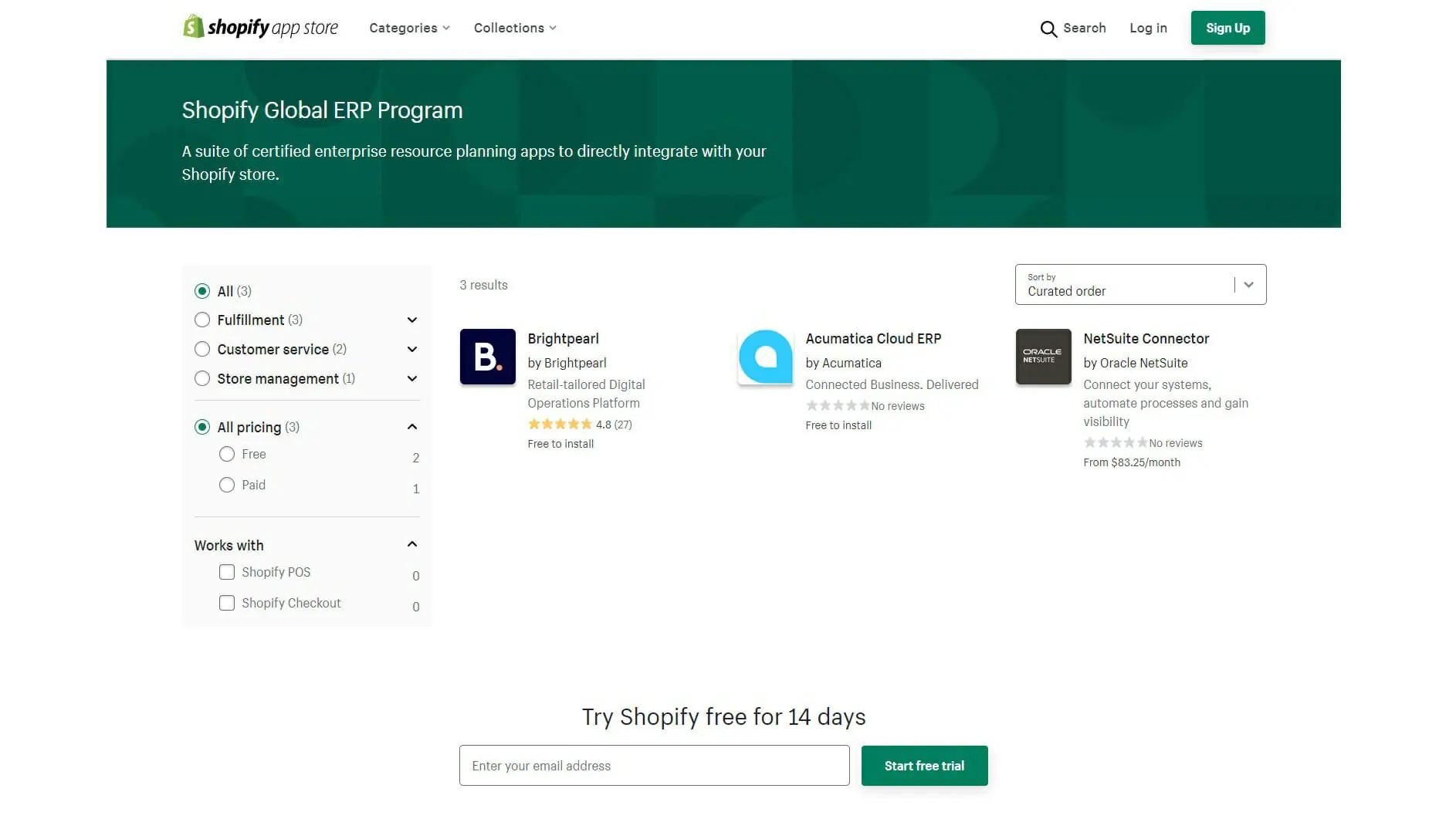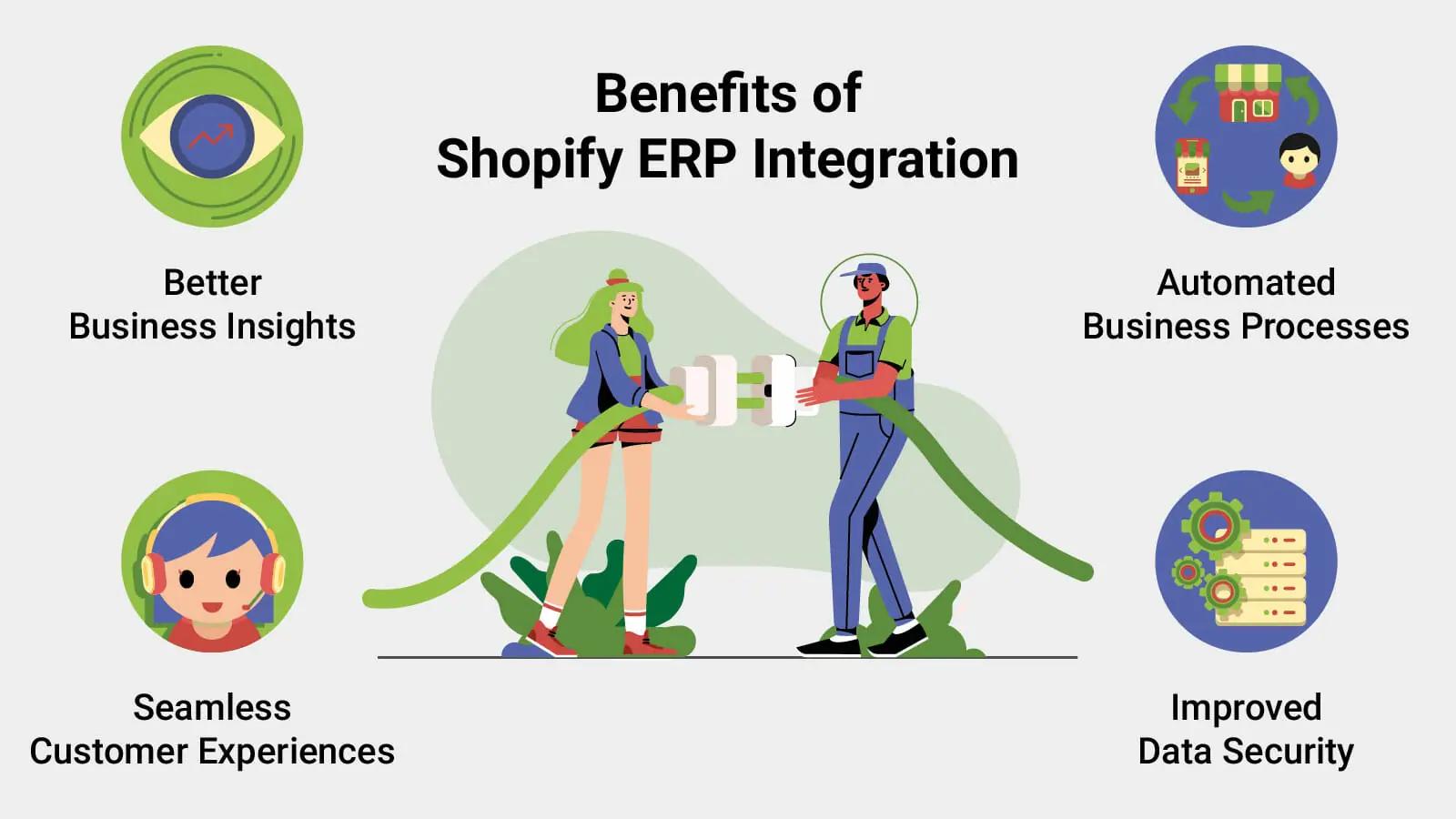Shopify ERP Integration: Definition, Benefits, and More

Research by Wunderman Thompson Technology reveals that 42% of customers consider a seamless experience across channels a top priority when shopping online. But implementing a multichannel approach successfully can be challenging for ecommerce business owners.
Shopify’s APIs help you integrate your store with numerous third-party systems. And the Shopify Global ERP program makes it easy to build robust integrations with leading Enterprise Resource Planning (ERP) systems such as Oracle Netsuite and Acumatica.
Want to learn how?
Keep reading to learn how a Shopify ERP integration can help optimize your business processes and build the ultimate omnichannel experience.
Shopify ERP Integration Explained

A Shopify ERP integration connects your Shopify store with distributed business systems using ERP software. It automates business processes like accounting & ship-fulfillment, and improves productivity through Electronic Data Interchange (EDI).
Integrating Shopify with ERP facilitates real-time information exchange between various systems and gives you a birds-eye view of your entire organization.
For example, you can integrate Shopify with an ERP software for real-time stock updates across your online and offline sales channels. That way, if your brick-and-mortar store runs out of stock for a product, your online store will update in real-time to reflect that change.
And the best part is that a Shopify ERP integration benefits all types of business models. Whether you’re selling B2C, B2B, or D2C, integrating your business systems with an ERP will help you create a customer-friendly omnichannel experience.
Overview of the Shopify Global ERP Merchant Program

Shopify’s Global ERP Program helps Shopify Plus users connect their online store with critical business systems such as accounting and inventory management using a centralized platform. Thus, users can:
Unlock workflows that facilitate informed decision making.
Control proprietary data without third-party involvement.
Improve operational efficiency by avoiding customized implementations.
The Shopify Global ERP program is one of the first of its kind where Shopify has partnered directly with leading ERP providers such as Oracle NetSuite and Microsoft Dynamics 365 Business Central to build integrations for the Shopify App Store as part of this program.
Shopify’s ERP program aims to simplify running an online enterprise. Regardless of the size of your business, it’ll help you manage business complexities while delivering performant and intuitive shopping experiences with Shopify.
Benefits of Shopify ERP integration

Selling online can be a complicated task. You need to balance multiple departments, systems, and compliances to process a single order. And this challenge becomes more complex as your business scales.Here are four ways a Shopify ERP integration can help you simplify these complexities at scale.
1. Better Business Insights
A Shopify ERP integration connects your Shopify store with your business systems. This integration provides real-time insights into your products, orders, inventory, accounts, and customers.
Such insights can help you identify bottlenecks, optimize processes, and make critical decisions to boost your business’s bottom line.
2. Automated Business Processes
Integrating Shopify with an ERP system facilitates automatic bi-directional data exchange and eliminates the need for manual data transfer. Your employees won’t need to enter order details into the accounting or inventory systems each time an order comes in.
This automation can reduce expensive human errors and allow your employees to focus on essential tasks.
3. Seamless Customer Experiences
96% of customers surveyed by Narvar said they would make a repeat purchase from a business that offers an easy returns process. A Shopify ERP integration is the best way to deliver a consistent shopping experience.
With real-time data exchange between business systems, your customers will be able to enjoy the convenience of in-store pickups and online returns across all sales channels.
4. Improved Data Security
A Shopify ERP integration can help you stay ahead of the rapidly evolving cybersecurity threat landscape and ensure better data security. With the help of automated, API-based data transfers, you can secure your confidential business data as it transmits to and from your online store.
Important Considerations When Integrating Shopify With ERP
Implementing a Shopify ERP integration is an arduous task. Here are four best practices to help you simplify your integration process.
1. Budget
The first thing you should consider with planning a Shopify ERP integration is your budget. ERP implementations can quickly go over budget, especially when using legacy systems or implementing unplanned modifications during the integration process.
Using providers from the Shopify Global ERP program is an easy way to keep costs low. But if you need a custom implementation with your ERP, reach out to the Shopify experts at Endertech for a quote. We can help you implement a successful Shopify ERP integration.
2. Ease of Use
When you introduce new software into your business processes, you’ll need to dedicate time and capital to train your employees to use it. Selecting an easy-to-use ERP system will help you improve adoption and minimize risks of failure.
Look for an ERP that provides you with features such as customized reporting functionality, dashboard customization, and user analytics. The more usable the software is, the easier it’ll be for your employees to adopt it.
3. Data Management
Proper data management is essential to a successful Shopify ERP integration. This is all the more critical when you’re implementing a custom solution. Good data management ensures a clean integration and minimizes implementation costs.
Make sure you map and normalize data properly and check its accuracy. The quality of your data directly influences the success of your integration.
4. End-to-End Testing
End-to-end testing is generally the final stage of a Shopify ERP integration. It’s important to test your data at the system level at every step of the customer lifecycle post-integration.
Thoroughly testing your implementation will help you identify data mapping issues, order rejections, and security issues. There’s no such thing as too much testing. Take your time with it and test the integration in every scenario possible.
Shopify ERP Integration: Automate Business Growth
A Shopify ERP integration simplifies running an online business by unifying your business processes into one system. Shopify’s partnership with leading ERP providers makes it easy for Shopify Plus users to integrate their enterprise systems with their commerce systems.
A well-executed integration can help you:
Access better business insights.
Automate your business processes.
Create a seamless shopping experience.
Improve your data security.
The best way to build a successful Shopify ERP integration is working with a partner that understands its complexities.
Book a free consultation with the Shopify integration experts at Endertech. We can help your business deliver cutting-edge shopping experiences with Shopify.
